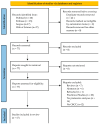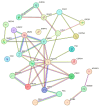Biomarkers Identification in the Microenvironment of Oral Squamous Cell Carcinoma: A Systematic Review of Proteomic Studies
- PMID: 39201614
- PMCID: PMC11354375
- DOI: 10.3390/ijms25168929
Biomarkers Identification in the Microenvironment of Oral Squamous Cell Carcinoma: A Systematic Review of Proteomic Studies
Abstract
An important determinant for oral squamous cell carcinoma (OSCC) onset and outcome is the composition of the tumor microenvironment (TME). Thus, the study of the interactions occurring among cancer cells, immune cells, and cancer-associated fibroblasts within the TME could facilitate the understanding of the mechanisms underlying OSCC development and progression, as well as of its sensitivity or resistance to the therapy. In this context, it must be highlighted that the characterization of TME proteins is enabled by proteomic methodologies, particularly mass spectrometry (MS). Aiming to identify TME protein markers employable for diagnosing and prognosticating OSCC, we have retrieved a total of 119 articles spanning 2001 to 2023, of which 17 have passed the selection process, satisfying all its criteria. We have found a total of 570 proteins detected by MS-based proteomics in the TME of OSCC; among them, 542 are identified by a single study, while 28 are cited by two or more studies. These 28 proteins participate in extracellular matrix remodeling and/or energy metabolism. Here, we propose them as markers that could be used to characterize the TME of OSCC for diagnostic/prognostic purposes. Noteworthy, most of the 28 individuated proteins share one feature: being modulated by the hypoxia that is present in the proliferating OSCC mass.
Keywords: CAFs; biomarkers; oral squamous cell carcinoma; proteomic; stroma; tumor microenvironment.
Conflict of interest statement
The authors declare no conflicts of interest.
Figures




Similar articles
-
Label-free plasma proteomics for the identification of the putative biomarkers of oral squamous cell carcinoma.J Proteomics. 2022 May 15;259:104541. doi: 10.1016/j.jprot.2022.104541. Epub 2022 Feb 26. J Proteomics. 2022. PMID: 35231661
-
Proteomic Profiling of Paired Interstitial Fluids Reveals Dysregulated Pathways and Salivary NID1 as a Biomarker of Oral Cavity Squamous Cell Carcinoma.Mol Cell Proteomics. 2019 Oct;18(10):1939-1949. doi: 10.1074/mcp.RA119.001654. Epub 2019 Jul 17. Mol Cell Proteomics. 2019. PMID: 31315917 Free PMC article.
-
Secretome profiling of oral squamous cell carcinoma-associated fibroblasts reveals organization and disassembly of extracellular matrix and collagen metabolic process signatures.Tumour Biol. 2016 Jul;37(7):9045-57. doi: 10.1007/s13277-015-4629-y. Epub 2016 Jan 13. Tumour Biol. 2016. PMID: 26762409
-
Tumor microenvironment in oral squamous cell carcinoma.Front Immunol. 2024 Dec 18;15:1485174. doi: 10.3389/fimmu.2024.1485174. eCollection 2024. Front Immunol. 2024. PMID: 39744628 Free PMC article. Review.
-
Current Understanding of the HIF-1-Dependent Metabolism in Oral Squamous Cell Carcinoma.Int J Mol Sci. 2020 Aug 24;21(17):6083. doi: 10.3390/ijms21176083. Int J Mol Sci. 2020. PMID: 32846951 Free PMC article. Review.
Cited by
-
The HIV Protease Inhibitor Ritonavir Reverts the Mesenchymal Phenotype Induced by Inflammatory Cytokines in Normal and Tumor Oral Keratinocytes to an Epithelial One, Increasing the Radiosensitivity of Tumor Oral Keratinocytes.Cancers (Basel). 2025 Jul 30;17(15):2519. doi: 10.3390/cancers17152519. Cancers (Basel). 2025. PMID: 40805215 Free PMC article.
-
Cell-Free DNA as a Prognostic Biomarker in Oral Carcinogenesis and Oral Squamous Cell Carcinoma: A Translational Perspective.Cancers (Basel). 2025 Jul 16;17(14):2366. doi: 10.3390/cancers17142366. Cancers (Basel). 2025. PMID: 40723249 Free PMC article. Review.
References
-
- Jang T.-H., Huang W.-C., Tung S.-L., Lin S.-C., Chen P.-M., Cho C.-Y., Yang Y.-Y., Yen T.-C., Lo G.-H., Chuang S.-E., et al. MicroRNA-485-5p Targets Keratin 17 to Regulate Oral Cancer Stemness and Chemoresistance via the Integrin/FAK/Src/ERK/β-Catenin Pathway. J. Biomed. Sci. 2022;29:42. doi: 10.1186/s12929-022-00824-z. - DOI - PMC - PubMed
Publication types
MeSH terms
Substances
Grants and funding
LinkOut - more resources
Full Text Sources
Medical

